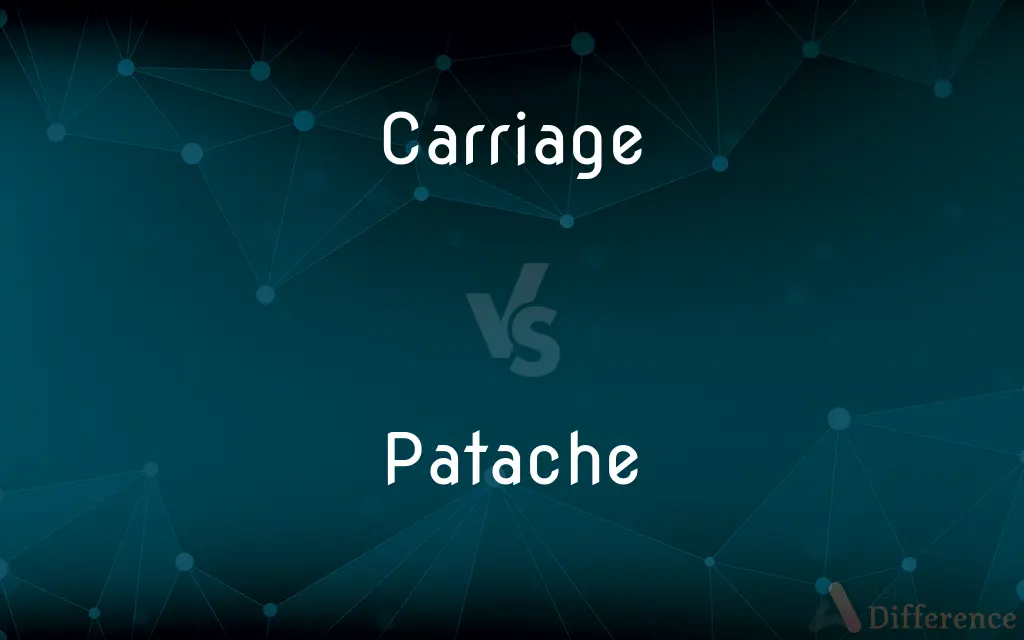Carriage vs. Patache — What's the Difference?

Difference Between Carriage and Patache
ADVERTISEMENT
Compare with Definitions
Carriage
A carriage is a private four-wheeled vehicle for people and is most commonly horse-drawn. Second-hand private carriages were common public transport, the equivalent of modern cars used as taxis.
Patache
A patache (occasionally "patax" or "pataje") is a type of sailing vessel with two masts, very light and shallow, a sort of cross between a brig and a schooner, which originally was a warship, being intended for surveillance and inspection of the coasts and ports. It was used as a tender to the fleet of vessels of more importance or size, and also for trans-Pacific travel, but later began to be used for trading voyages, carrying cargo burdens of 30 tons or more.
Carriage
A wheeled vehicle, especially a four-wheeled horse-drawn passenger vehicle, often of an elegant design.
Patache
A dispatch-boat; a small vessel used to communicate between the vessels of a fleet.
Carriage
Chiefly British A railroad passenger car.
ADVERTISEMENT
Patache
A horse-drawn carriage with two wheels used in France.
Carriage
A baby carriage.
Patache
A tender to a fleet, formerly used for conveying men, orders, or treasure.
Carriage
A wheeled support or frame for carrying a heavy object, such as a cannon.
Carriage
A moving part of a machine for holding or shifting another part
The carriage of a typewriter.
Carriage
The act or process of transporting or carrying.
Carriage
(kărē-ĭj) The cost of or the charge for transporting.
Carriage
The manner of holding and moving one's head and body; bearing.
Carriage
(Archaic) Management; administration.
Carriage
The act of conveying; carrying.
Carriage
Means of conveyance.
Carriage
A (mostly four-wheeled) lighter vehicle chiefly designed to transport people, generally drawn by horse power.
The carriage ride was very romantic.
Carriage
A railroad car
Carriage
The manner or posture in which one holds or positions a body part, such as one's arm or head.
The runner has a very low arm carriage.
Carriage
A manner of walking and moving in general; how one carries oneself, bearing, gait.
Carriage
(archaic) One's behaviour, or way of conducting oneself towards others.
Carriage
The part of a typewriter supporting the paper.
Carriage
A shopping cart.
Carriage
(British) A stroller; a baby carriage.
Carriage
The charge made for conveying (especially in the phrases carriage forward, when the charge is to be paid by the receiver, and carriage paid).
Carriage
(archaic) That which is carried, baggage
Carriage
That which is carried; burden; baggage.
David left his carriage in the hand of the keeper of the carriage.
And after those days we took up our carriages and went up to Jerusalem.
Carriage
The act of carrying, transporting, or conveying.
Nine days employed in carriage.
Carriage
The price or expense of carrying.
Carriage
That which carries of conveys,
Carriage
The manner of carrying one's self; behavior; bearing; deportment; personal manners.
His gallant carriage all the rest did grace.
Carriage
The act or manner of conducting measures or projects; management.
The passage and whole carriage of this action.
Carriage
A railcar where passengers ride
Carriage
A vehicle with four wheels drawn by two or more horses
Carriage
Characteristic way of bearing one's body;
Stood with good posture
Carriage
A machine part that carries something else
Carriage
A small vehicle with four wheels in which a baby or child is pushed around
Share Your Discovery

Previous Comparison
Broiler vs. Cockerel
Next Comparison
Psc vs. Pcs














































